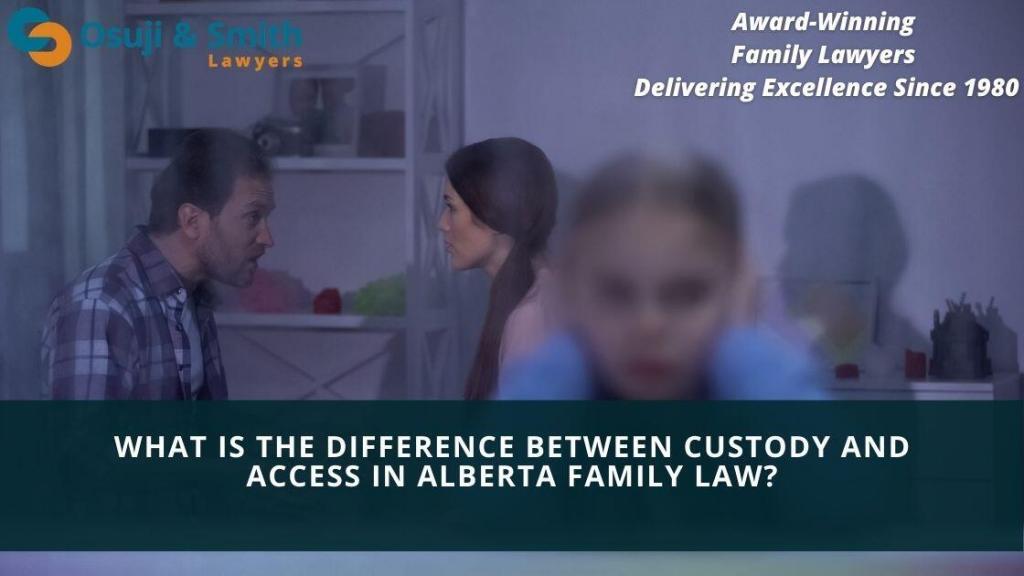What is the difference between custody and access in Alberta family law?
Custody and access are basic elements of family law in Alberta. The difference between custody and access is important in separation or divorce situations involving children.
What is custody?
Custody is the legal authority to make decisions about the child. A parent with custody has the responsibility of caring for the child. The custodial parent has the right to make decisions about the child’s schooling, religion, health care, and other decisions about the child’s daily life and upbringing.
There are 4 types of custody in Alberta.
Joint Custody
A joint custody arrangement gives both parents custody of the child. Both parents are responsible for the child’s upbringing and make major decisions about the child’s life together. One parent alone cannot make major decisions about the child.
In this situation, the child can live with only one parent or may split their time living with each parent. Joint custody does not necessarily mean the time the child spends with each parent is equal.
Joint custody requires both parents to be willing to put aside personal differences and work together for the best interests of the child.
Shared Custody
A shared custody arrangement gives both parents custody, but each parent’s custodial power is more clearly defined. This usually means that the child’s time with each parent is split equally.
Shared custody is most often used when a joint custody agreement is preferred, but the parents have difficulty cooperating with each other.
Split Custody
A split custody arrangement is for situations where there is more than one child, and the children don’t all live with the same parent. One or more children live with one parent, and the other children live with the other parent.
In this scenario, each parent is responsible for the children in their care while the other parent has access.
Sole Custody
Sole custody is when only one parent has decision-making authority for the child. The child lives with only one parent, and that same parent is responsible for all the major decisions about the child.
In a sole custody situation, the other parent may have access to the child and usually continues to pay child support and assume other financial responsibilities for the child.
What is access?
Access is the legal right of the child and parent to spend time together. It is the right of the child to have access to the parent (so the custodial parent cannot refuse the child access to the other parent), and it is the right of the parent to have access to the child.
A parent with access does not have decision-making authority over the child, but they do have the right to information about the child (such as decisions made about the child’s schooling or health).
In most cases, a parent who does not have custody will have access to the child. Access arrangements can also apply to other family members, like grandparents.
An access arrangement might include a specific schedule or it may be left as “reasonable access”, which is simply a flexible schedule agreed to by the parents. This agreement can also include access to specific information or events, such as attending parent-teacher conferences or the right to be involved in decisions about medical treatment.
Some access agreements may include conditions or restrictions such as prohibiting the access parent from drinking alcohol before or during visits with the child. And, in situations where there’s concern about the child’s safety, the Court may require access to be supervised or forbid access entirely.
Access & Custody in Alberta Law
Alberta’s Family Law Act uses the term “parenting” instead of “custody” and “access”. Alberta Courts prefer to let the parents make arrangements for the child’s best interests without clearly distinguishing between access and custody.
The federal Divorce Act used to differentiate between custody and access, and the distinction between these terms was particularly important in some situations like applying for a passport. However, as of March 1, 2021, the Act “now features concepts and words that focus on relationships with children, such as parenting, decision-making responsibility, parenting time, and contact.”
The Best Custody & Access Agreement for Your Child
The best custody and access agreement for your child is one that both parents agree upon and are committed to. If the parents cannot agree on a parenting plan, there are 3 alternatives before taking the matter to court:
- Mediation – A mediator is trained to facilitate discussions, explore options, and negotiate an agreement without bias. Mediation services are offered by Alberta Justice or through the Alberta Family Mediation Society.
- Custody Assessment – Also referred to as a home study, a custody assessment involves a social worker, psychologist, or psychiatrist who will meet with the parents, friends, relatives, and sometimes the children. The assessor observes the family situation and relationships and provides recommendations for a parenting plan.
- Lawyer-Assisted Settlement – The parents and their lawyers can discuss custody and access arrangements informally to avoid taking the case to court.
When a custody and access case is brought to court, the parents have less control over the final arrangement. The judge has the final say. A court-ordered arrangement can only be altered if both parents agree to the changes.
How Alberta Courts Determine Custody & Access Arrangements
Alberta Courts determine custody and access arrangements based on several factors, including:
- Which parent has been most responsible for the child until now
- Problems or behaviours that make it difficult for a parent to care for the child properly, such as mental instability, addictions and substance abuse, or criminal activities
- The environment a parent provides for the child, such as type of housing, distance to school, parent’s work schedule and support system
- The parent’s future plans, such as major lifestyle changes or new relationships
- The parents’ attitudes toward each other and their willingness to allow access
- The child’s wishes (if they have reached the age of maturity)
Custody and access are never decided based on gender, financial status, or who was at fault for the marriage breakdown.
Negotiating a custody and access agreement can take a long time, so the Court can issue an interim custody order. This is a temporary arrangement that decides who has custody of the child until the final decision is made.
Help for Custody & Access Arrangements in Calgary
The experienced family law lawyers at Osuji & Smith can help you resolve custody and access issues. If you need help with a custody and access agreement, or if circumstances have changed and you need your agreement changed, please contact us.
If you or the other parent is moving to another city, province, or country, consult a family law lawyer at Osuji & Smith to ensure the agreement isn’t breached and the best interests of the child are maintained.






